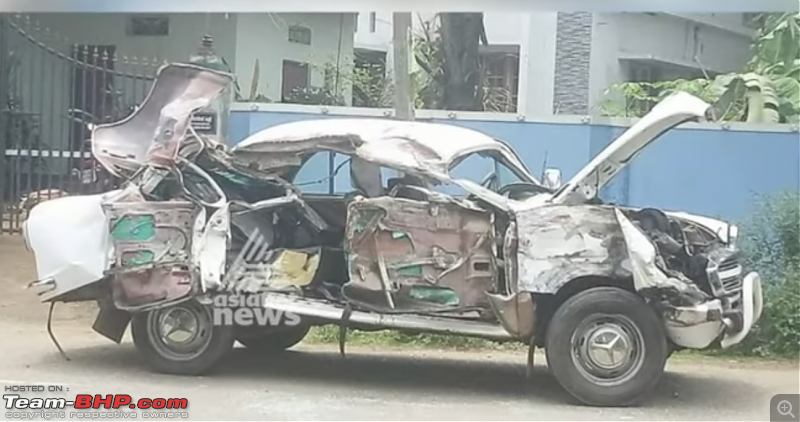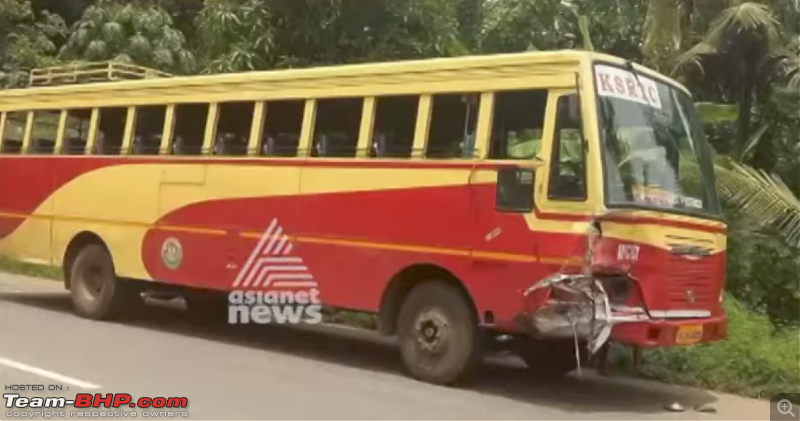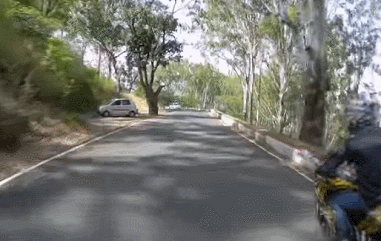Quote:
Originally Posted by binand  You could also try my "trick" - just go behind the car before entering it and observe the general conditions of the route you need to take in reverse. |
Ture, even I do that. Whenever I walk to my car, I inspect every corner before getting in.
Quote:
Originally Posted by Blur  My brother's Ciaz has the reverse sensors-camera combo. I believe that works best. As rightly pointed out by some, the sensors could beep to kingdom come even if it's a roadside bush near the bumper, but the camera will show you exactly what it is.
Add the ORVMs to this, pointed just behind the rear wheel of your car, and you can avoid any ditches that might be lurking out there. Know this from personal experience. Was backing up near one recently. A guy could see I was, but didn't make any move to warn me. In the end I managed on my own!
Also it's a good habit to manually inspect all sides of your car before moving out of a spot you had parked at a while ago. Umpteen times have found brilliant biker dudes parked within inches of my rear bumper, who would naturally be invisible from inside the car. |
It was me who pointed out the camera thing. And man are those bikers very irritating

. They seriously prove to be a headache because you have to pull bikes out of the way, take your car out and then put the bikes back. The biggest nuisance is at my home. Just opposite to my home is the house of an architect and people come to visit his house. My car is parked outside my house where there is shade. Almost everyone who come to his house park inches away to my car to get the best of the shade they can find. Such a nuisance because the front of his house is always empty and the front of my house always littered with bikes surrounding my car.
But the point I was trying to tell earlier is also this. In modern car, all the bikes disappear but in my maruti, I can see the handlebar of a parked bike.
Quote:
Originally Posted by Thad E Ginathom  No, I meant that she used both feet: one on the clutch! Which was what was under discussion at the time.
At the end of her life, she drove a little Nissan Micra. Servo assisted brakes. When did these come into use? My parents (Dad born 1913) very likely experienced cars without them, just as they learned to change gear without syncromesh. There has been servo assist on every car I have touched the brake pedal of. Yes, with the engine off, it is very hard work, and I would hate to think of applying that much pressure every time.
ABS on gravel and sand: it is not that it makes things worse, but it does not make them better! It doesn't do much on ice either. |
Maruti 800 till I guess 2000 came with unassisted brakes. Same with Omni. But in all fairness, these are very light cars 600 kgs and you do not need much pressure on the brake. The brakes are definitely not as light as the servo assisted brakes but to stop in time, you don't have to stand on them. In sudden brakes, the braking force is like applying force to a foot pump to fill air into the car.
About the discussion of braking with clutch or without it, I think the former makes more sense. If when you apply brakes, your car tyres can lock up, it means that the car brakes are capable enough by themselves to stop the car. So engine braking is redundant. Engine braking might reduce the load applied on the B pedal, but that's about the only advantage, theoretically.
However, when you come to practical side, things are different. Brakes become hot and loose their braking ability. So, in situations where you use the brakes so very often, it is useful to let the brakes cool down and use engine braking instead.
For instance, when going down a ghat road, don't hold the clutch and coast down with occasional application of brakes. Put it in 3rd or 4th gear and modulate the A pedal to maintain speed. If necessary, don't refrain from using brakes but stay cautious not to overcook the brakes because overcoooking can lead to brake failure.
Also, when you are in traffic, since you will be doing a lot of braking, don't hold the clutch and brake on every instance. When you have to slow down for a stop gradually, ease of the accelerator and let the car slow down. When the car slows down enough, apply brakes.
I usually use engine braking even on highways. Whenever I am at a distance from an obstacle, I let go of my A pedal slowly that the car can decelerate. When I am close to the obstacle, then I use clutch + brakes. I think there is nothing better than clutch + brakes in emergency.
Using engine braking in emergency situations might also be dangerous because our brakes apply force evenly to all brakes whereas engine braking only brakes a set of front or rear wheels depending on your car. So, one set of wheels might lock up while the other might just be ineffective. I think we should refrain from engine braking then. Also, passengers would poo in their pants if they hear engine revving to max in emergency situations.
I also don't think that ABS is better than expert braking under any situations. That is the reason why rally cars do not have ABS. There is a concept called static friction and dynamic friction. When a body is at rest, the force you need to apply to make it move, lets say is 10 Newtons. But, when the body starts to move, the friction is only 8 Newtons.
When a tyre rolls, the tyre patch has static friction with the road surface because the tyre does not slip w.r.t the ground. Then there is more frictional force holding the tyre to the ground and hence more effective braking. When the tyre is slipping (car is skidding),dynamic friction acts and so braking is less effective. Hence modulating the brakes just to the limit is more effective than any ABS or other technology.
An ABS module cannot modulate brakes so that they just don't slip. It only intervenes for millisecond so that our brakes can unlock and get some traction so that when you turn the steering, the car can actually take a turn. But thinking ABS brakes stops car better is foolish. ABS helps in the case of noobs (no offence to anyone) who just slam the brakes in an emergency to steer them away from an accident but does not aid in braking if you are an expert.
ABS also helps in the case of noobs (again, no offence) who slam their brakes. When you slam the brakes, your dynamic friction is lower and so by releasing the brakes for a millisecond, you are re-engaging the brake and until the next lockup in the next millisecond, you have static friction. So, ABS definitely helps. But, if you can modulate the brakes, you have static friction throughout and you can stop even faster.
ABS helps to take turn in panic braking and is better than locking up wheels but if you can modulate your brakes, you are always better than ABS.
Also, on gravel surfaces or snow, you might want to turn off the ABS because the loose stones means the ABS sensor thinks that we are loosing traction and cuts off the brakes leaving the car rolling on the loose gravel happily. If you lock up, the tyre will bury past the loose surface and anchor itself to the ground providing better braking.
You can read more here
http://www.sdt.com.au/safedrive-directory-ABSBRAKES.htm  (3)
Thanks
(3)
Thanks
 (9)
Thanks
(9)
Thanks

 (4)
Thanks
(4)
Thanks
 (5)
Thanks
(5)
Thanks
 (2)
Thanks
(2)
Thanks
 (1)
Thanks
(1)
Thanks

 (2)
Thanks
(2)
Thanks
 (12)
Thanks
(12)
Thanks
 (2)
Thanks
(2)
Thanks
 (4)
Thanks
(4)
Thanks
 (2)
Thanks
(2)
Thanks








 . They seriously prove to be a headache because you have to pull bikes out of the way, take your car out and then put the bikes back. The biggest nuisance is at my home. Just opposite to my home is the house of an architect and people come to visit his house. My car is parked outside my house where there is shade. Almost everyone who come to his house park inches away to my car to get the best of the shade they can find. Such a nuisance because the front of his house is always empty and the front of my house always littered with bikes surrounding my car.
. They seriously prove to be a headache because you have to pull bikes out of the way, take your car out and then put the bikes back. The biggest nuisance is at my home. Just opposite to my home is the house of an architect and people come to visit his house. My car is parked outside my house where there is shade. Almost everyone who come to his house park inches away to my car to get the best of the shade they can find. Such a nuisance because the front of his house is always empty and the front of my house always littered with bikes surrounding my car.
 here in this accident thread, let me try to answer your query with the practice that I follow:
here in this accident thread, let me try to answer your query with the practice that I follow: .
.